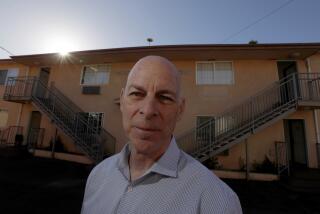SEC says L.A. developer who bought celebrity real estate ran $1 billion Ponzi scheme
When small-time investors entrusted their money to Sherman Oaks firm Woodbridge, they were told the funds would be used to make profitable high-interest real-estate loans.
But the Securities and Exchange Commission said that’s not what happened to the vast majority of the $1.22 billion invested in the Woodbridge Group of Cos. over the past five years.
Instead, in a lawsuit filed in federal court in Florida this week, the agency said Woodbridge and its L.A. owner, Robert H. Shapiro, used investors’ money to fund their own real estate projects — including buying and renovating celebrity properties in L.A. and building luxury homes in Aspen and other Colorado resort towns.
And it alleged that most of the promised payments to investors were in fact funded by infusions of cash from new investors. That’s the very definition of a Ponzi scheme.
The SEC said in a court filing this week that Woodbridge used $368 million in money from new investors to pay principal and interest owed to previous investors.
What’s more, the agency alleges that Shapiro — not to be confused with L.A. celebrity attorney Robert L. Shapiro — personally misappropriated $21 million, using it to buy luxury goods, charter private planes and pay alimony.
“Woodbridge’s business model was a sham,” the agency said in its lawsuit, which alleges numerous violations of securities laws. “Shapiro and Woodbridge continued its ruse for the past several years by supporting its business operations nearly entirely by raising and using new investor funds, in classic Ponzi scheme fashion.”
The company also has been the subject of investigations by regulators in several states for selling unregistered securities. Some states, including Massachusetts and Michigan, ordered the firm to stop selling the securities.
An attorney for Shapiro did not return calls for comment but told the Wall Street Journal that Shapiro “denies any allegation of wrongdoing and looks forward to his opportunity to defend himself in a court of law.” Adam Schwartz, an attorney for Woodbridge, declined to comment.
Woodbridge, a web of real estate finance and development companies, filed for bankruptcy earlier this month, more than a year after the SEC opened an investigation into its practices. Named defendants in the SEC lawsuit include Shapiro, his trust, Woodbridge, seven Woodbridge-affiliated investment funds and more than 200 limited liability companies, many of which were set up to hold individual properties.
A document filed by Woodbridge in bankruptcy court says the company, through those LLCs, owns 138 properties ranging in value from $50,000 to $150 million. A Woodbridge representative said about 50 of those properties are in the Los Angeles area, and most of the rest are in Colorado.
One property known to be among Woodbridge’s holding is the historic Owlwood estate in Holmby Hills, a former home of actor Tony Curtis and singing duo Sonny and Cher. Woodbridge acquired it for $90 million last year and listed earlier this year at twice that.
Another property in the portfolio, according to a source familiar with Woodbridge’s holdings, is the home at 1 Electra Court in Hollywood Hills West. Film producer Megan Ellison, daughter of software billionaire Larry Ellison, bought the home and adjacent land for $30 million in 2013 and sold it to Woodbridge this year reportedly for more than $35 million.
Other L.A. properties are mostly homes in exclusive neighborhoods including the Bird Streets, Hollywood Hills, Holmby Hills and Bel-Air, the Woodbridge representative said. The Colorado properties are mostly undeveloped parcels in resort towns including Aspen and Snowmass Village.
The properties in both states “are in various stages of development or renovation,” and worth between $650 million and $750 million in their current state, according to the filing. That’s far short of the $961 million the SEC says is owed to Woodbridge investors.
The SEC also alleges that Woodbridge owns and channeled funds to several other companies it owns, including L.A. luxury real estate brokerage Mercer Vine. Those companies are not named as participants in the scheme or accused of wrongdoing but could be forced to disgorge funds traced back to any illegal activity.
The SEC alleges Woodbridge raised money from some 8,400 investors, many of them retirees, starting in July 2012. Now based in Sherman Oaks, the company maintains an office and was previously headquartered in the retiree haven of Boca Raton, Fla., according to the SEC, which noted many of the company’s investors are seniors.
Woodbridge maintained its own sales representatives and a network of outside sales agents, which the SEC alleged employed “aggressive cold calling campaigns, social media, websites, seminars and in-person presentations” to pitch investors. The company paid $64.5 million in sales commissions, mostly to sales agents not licensed to sell securities, according to the SEC suit.
Woodbridge, according to the SEC, told investors it would use their money to make so-called “hard money” loans — a type of expensive, short-term loan that’s secured by property and is often used by house flippers and other property developers. Instead, the SEC alleges nearly all of the funds went directly into Shapiro and Woodbridge’s own projects.
Despite raising more than $1 billion dating back to 2012, Woodbridge collected only $13.7 million in interest from outside borrowers, according to the SEC.
Meanwhile, the SEC alleges that Shapiro’s real estate development business — the true recipient of investors funds — was not making much money, and that any profits were “woefully inadequate to satisfy its ever-increasing obligations to investors.”
Along with suing Woodbridge and Shapiro for violations of securities law, the SEC this week also asked a federal judge to appoint a receiver in the Woodbridge bankruptcy case, arguing that without a receiver the bankruptcy proceedings may benefit Shapiro to the detriment of investors.
The agency notes that the company is set to pay Shapiro a consulting fee of $175,000 per month during the bankruptcy process. Woodbridge is fighting that move, saying a court-appointed receiver is not needed.
Follow me: @jrkoren
More to Read
Inside the business of entertainment
The Wide Shot brings you news, analysis and insights on everything from streaming wars to production — and what it all means for the future.
You may occasionally receive promotional content from the Los Angeles Times.











